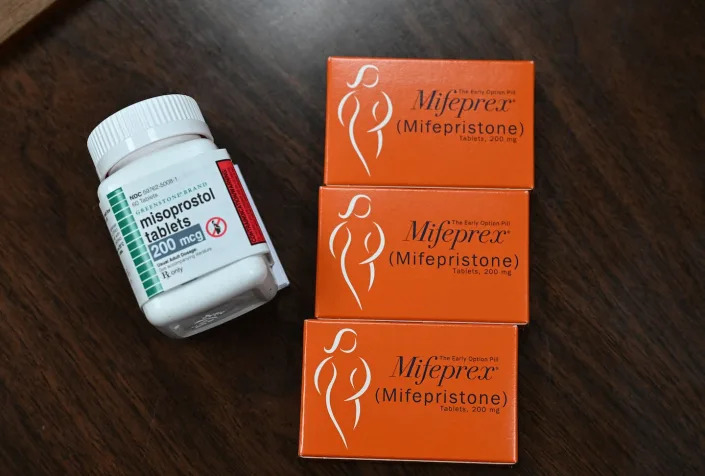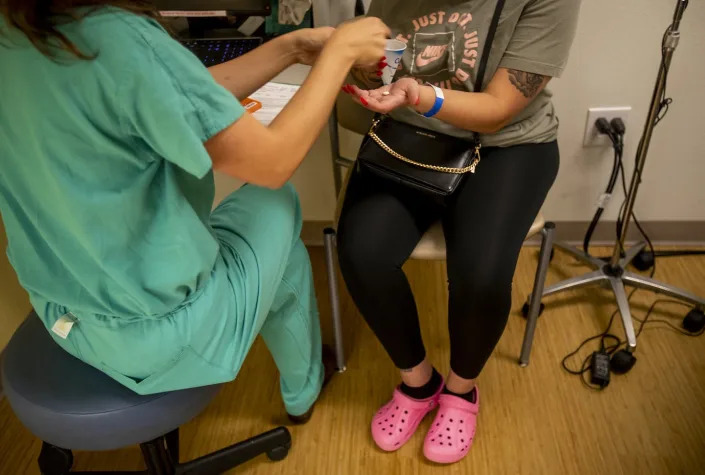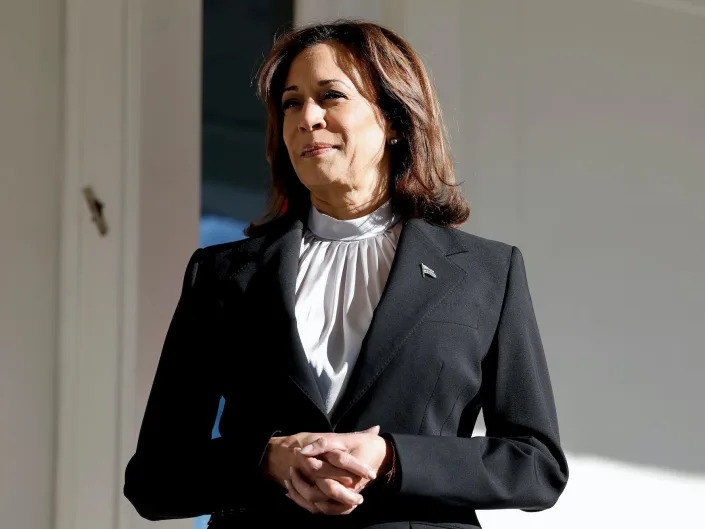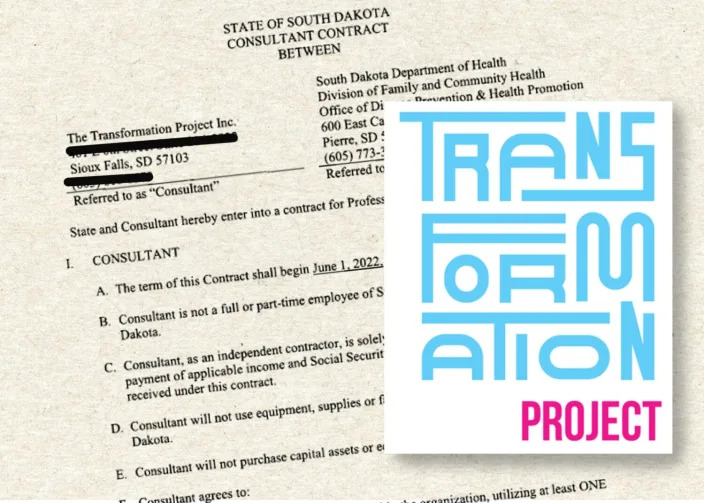Nicole Ki and Sam Stroozas
March 2, 2023

From left to right: Hannah Edwards, Hildie Edwards, Dahlia Edwards and Dave Edwards. Hildie was Grand Marshall at a local pride parade.
Courtesy of the Edwards family
Minnesota’s Legislature is considering a bill that would make the state a safe haven for transgender youth seeking health care. That means trans youth traveling from other states would be protected in seeking gender-affirming health care in Minnesota.
Parents Hao and Gretchen Nguyen, who have a 6-year-old trans daughter and spoke in support of the bill at a hearing last month, say it’s a big deal for trans youth in Minnesota and across the country.
“It should be as simple as it is for Hao and I to take Asher to the doctor for every parent,” said Gretchen Nguyen. “It shouldn’t matter where they are. I also see this as helping to affirm those that are here and making sure that they’re secure in the fact that their representatives have their back.”
But what exactly is the bill seeking to protect? We asked parents, a doctor and the state’s first openly trans legislator what gender-affirming care means. Here are some of the questions they answered.
What is gender-affirming care?
Gender-affirming health care is specialized health care that meets the needs of transgender and gender-diverse youth and their families, according to Dr. Angela Kade Goepferd, chief education officer and medical director of Children’s Minnesota’s gender health program.
That often includes annual pediatric visits where a doctor will check in with a child on what they’re thinking and how they’re feeling, track their mental and physical development and offer support to families navigating school, sports, community activities and social settings.
“It’s knowing for a kid in a family that they can go to a place where everyone there has experience working with kids and families who are transgender and gender-diverse, and knows how to support their family in terms of the questions they’re having, conflict within their family and knows how to support their kids in their school system,” said Goepferd.
In the first visit, Goepferd typically fields questions from kids and parents wondering what to do. The questions are often “What’s next, whether that’s a younger child and the parents are wondering, should we talk about this? Should we not talk about it? How should we talk about it?”
Or, if the child is asking to be called a different name, “Should we change it at school? Should we not change it?”
Much of the national discourse around health care for trans kids and teens has focused on medication and surgery, but Goepferd, who has worked with LGBTQ youth for 16 years, emphasized medications are not a part of gender-affirming care at Children’s Minnesota until kids reach puberty, typically between 12 and 16.
“Once adolescents reach puberty, or the second stage of puberty, they may become eligible for reversible treatments to pause their puberty while they either wait for the emotional and physical developmental maturity to participate in the decision around hormones, or just give them some more time to explore with their therapist and family what the best outcome might be for them going forward,” Goepferd said.
Goepferd added that Children’s Minnesota does not perform surgical procedures on anyone under 18 as part of gender-affirming care, and said in general “it is rare that anyone under the age of 18 accesses surgical procedures as a part of their gender-affirming care.”
Who does it impact?
Gender-affirming care impacts gender-diverse and transgender youth, who start to understand their gender identities at the age of 3 and 4, said Goepferd. Children’s Minnesota’s gender health program sees patients ranging from 4 to 20 years old.
In a 2022 survey of Minnesota students, the Minnesota Department of Health confirmed with MPR about 10 percent of students in eighth grade or higher identified as non-cisgender, which includes transgender, genderfluid, nonbinary and two-spirit identities.
“That’s not an insignificant number,” said Goepferd. “We in our program are probably somewhere around 150 new patients every year, and we’ve been open for almost four years now. So that’s a significant number of close to 600 patients that we’ve seen so far.”
The number of kids and teens traveling out of their states to seek gender-affirming care in more welcoming states like Minnesota are rising, said Goepferd. With the introduction of anti-transgender legislation across the country, Children’s Minnesota has seen an increase in calls from families and providers over the last two years with questions about getting gender-affirming care, or asking if they can transfer patients over to their gender health program.
The calls came from neighboring states like Montana and South Dakota, all over the Midwest and as far as southern states like Florida and Texas, said Goepferd. Some families have relocated to Minnesota seeking a safer environment for their trans kids and to be closer to gender-affirming care.
Gender-affirming care impacts gender-diverse and transgender youth, who start to understand their gender identities at the age of 3 and 4, said Goepferd. Children’s Minnesota’s gender health program sees patients ranging from 4 to 20 years old.
In a 2022 survey of Minnesota students, the Minnesota Department of Health confirmed with MPR about 10 percent of students in eighth grade or higher identified as non-cisgender, which includes transgender, genderfluid, nonbinary and two-spirit identities.
“That’s not an insignificant number,” said Goepferd. “We in our program are probably somewhere around 150 new patients every year, and we’ve been open for almost four years now. So that’s a significant number of close to 600 patients that we’ve seen so far.”
The number of kids and teens traveling out of their states to seek gender-affirming care in more welcoming states like Minnesota are rising, said Goepferd. With the introduction of anti-transgender legislation across the country, Children’s Minnesota has seen an increase in calls from families and providers over the last two years with questions about getting gender-affirming care, or asking if they can transfer patients over to their gender health program.
The calls came from neighboring states like Montana and South Dakota, all over the Midwest and as far as southern states like Florida and Texas, said Goepferd. Some families have relocated to Minnesota seeking a safer environment for their trans kids and to be closer to gender-affirming care.

From left, Hao Nguyen, Ronin Nguyen, Gretchen Nguyen and Asher Nguyen pose for a photo.
Courtesy of Gretchen Nguyen
What does gender-affirming care look like?
Parents say gender-affirming care is similar to routine pediatric visits most kids go to, with some added questions on gender identity.
“It's similar to other pediatric care in that the doctors are answering questions that aren't necessarily like, ‘Is my child's arm broken or not?,” said Gretchen Nguyen.
Many families have to leave their primary pediatrician to seek expertise in gender-affirming care, like the Nguyens.
“The pediatrician kind of had nothing for me,” said Gretchen. “She was just like, ‘sometimes that happens and kids grow out of it.’”
For the Nguyens’ 6-year-old trans daughter, Asher, the gender health clinic at Children’s Minnesota is a safe place. Asher’s correct pronouns are used and the Nguyens can ask about Asher’s development, when it’s appropriate to talk about puberty blockers and resources they can use to affirm her gender identity and inform Asher’s future decisions once she gets older.
“There’s really no anxiety for her when she gets there,” said Hao. “Fast forward five years from now, it’s nice for her to have the same doctor who understands this very specific issue. So when we talk about gender-affirming care, I think creating these safe spaces to inform and educate decisions later that the child’s really comfortable with is part of that.”
Others, like Hannah Edwards and her 12-year-old daughter, Hildie, are at the stage to start exploring medication options, such as hormone blockers.
Since age 8, Edwards’ daughter Hildie has seen a pediatrician specializing in gender-affirming care. After several visits and conversations with her counselor, doctor and family, Hildie decided to start hormone blockers.
“The peace of mind that I saw it give Hildie was incredible,” said Edwards. “She went from obsessively thinking and worrying about the changes that were starting to happen to her body to just kind of getting to be a kid for a while longer. That was a huge blessing.”

Hildie Edwards poses at a Pride parade.
Courtesy of the Edwards family
Why do advocates say it’s important for trans kids to have access to gender-affirming health care?
Goepferd, who has seen a rise in the demand for gender-affirming care across the nation, said the trans refuge bill is about saving young people’s lives.
“We’re in the middle of a mental health crisis in this country,” said Goepferd. “Our children, particularly our teenagers, have higher rates of depression, anxiety and suicidality than it ever had, before the American Academy of Pediatrics declared mental health as a crisis for kids.”
According to the 2022 Minnesota Student Survey, of the 10 percent of students surveyed that identified as non-cisgender, 65 percent reported having long-term mental health, behavioral or emotional problems.
Because kids with transgender and gender-diverse identities often experience stigma and discrimination, Goepferd said they will have higher rates of anxiety, depression and suicidality.
“What the research tells us is that when those kids have access to gender-affirming care, to supportive adults, to resources, they do better,” said Goepferd. “They have a more positive sense of self and have less anxiety, depression and suicidality symptoms.”
Medical societies, like the American Medical Association and Children’s Hospital Association, support gender-affirming care because research shows access to this care improves the health and overall well-being of trans youth.
A video of Hao Nguyen speaking in support of his daughter at a hearing for the bill went viral on TikTok and garnered thousands of comments. The comments gave him insight into the impact the bill could have.
“I read all of them,” said Hao. “They’re grown Ashers who are now in their lives, sitting at their homes, in their beds or in their jobs, listening to this testimony. Their comments are stuff like ‘I wish I had a safe place like this. I wish I had a safe place in that family like this. I wish I had a safe state that’s going to do something like this. I wish I wasn’t so afraid to be in the state that I’m in.’”
What is the trans refuge bill?
Rep. Leigh Finke, DFL-St. Paul, who is the sponsor of the trans refuge bill (HF146), said that in simple terms, the bill would protect folks seeking gender-affirming health care. While gender-affirming health care has not been banned in Minnesota, it has been banned in neighboring states, such as South Dakota where Gov. Kristi Noem signed a bill in February banning both surgical and non-surgical gender-affirming treatments for minors in the state.
Finke said the need will only increase as other states continue to ban care. She said Minnesota would be the fourth state to become a trans refuge state.
“The law would make it so that people who live in states who have banned or restricted gender-affirming care can come to Minnesota to access that care and be protected from the laws that govern their home states,” Finke said.
Finke said many of the stories she has heard discuss the impact of care on trans youth and the danger that they may face when the care is unprotected and can be removed at any point.
“Even if your state is trying to ban health care, you’re at risk by simply existing in that state. That’s what I am hearing people say: I’m not going to wait — we need to go somewhere that is safe for my child right now.”
In line with anti-trans arguments nationwide, several Minnesota legislators and organizations have questioned the impact of minors using hormone blockers or cross-sex hormones, even though the bill itself does not attempt to legislate that.
In the House Judiciary Finance and Civil Law Committee meeting on Feb. 21, Rep. Matt Grossell, R-Clearbrook, asked about partially irreversible physical changes that can happen while receiving gender-affirming care, such as facial hair growth for trans men and breast development for trans women.
“Some of these youth may be left with some partially irreversible things that they would be scarred with for life,” Grossell said.
Goepferd was present at the hearing and said that bodily changes associated with gender affirming care happen “very slowly, over time” and that a child would be “well over 18 before they were experiencing significant changes that could be considered permanent.”
“When we force transgender children to go through a puberty that does not align with their identity, they experience significant mental health distress, and that is what we are trying to prevent,” Goepferd said.
Another line of criticism focused on the bill language, which modifies existing law about court jurisdiction involving children. The bill would make seeking gender-affirming care a factor in some assessments for whether a Minnesota court has jurisdiction to make an initial determination in child-custody cases. It also would give courts temporary emergency jurisdiction if a child is here because they have been unable to get gender-affirming health care somewhere else.
“Simply put, the custody provisions of the bill are allowing temporary jurisdiction in the state of Minnesota for custody cases to be heard. It doesn’t change anything about how a custody case would be heard in the state of Minnesota,” Finke said.
Rep. Peggy Scott, R-Andover, said in the committee meeting that she sees the bill as “an assault on parental rights,” saying she has concerns on “the whole custody piece” of the bill. Scott brought up an example of parents living in different states, one in favor of gender affirming care and one against.
“I feel like it gives one parent an advantage over the other in cases where there is some shared parenting going on,” Scott said.
“The idea that there are custody cases where both parents can't have their opportunity to be heard sounds like a very serious problem in a custodial court system,” Finke said, “but I don't think that has anything to do with gender-affirming care.”

Hildie Edwards, a 12-year-old transgender girl, testifying at a Senate Judiciary Committee hearing for the trans refuge bill on Feb. 10.
Screenshot via video
“Emergency jurisdiction is necessary in this bill because what we are doing, what we are saying is that parents have a right to receive gender-affirming care if they live in South Dakota. And if South Dakota is not going to allow those parents to provide for the best care for their child, then Minnesota can do that, and if that's going to lead to custodial decisions, then we need to be able to have temporary emergency custody in the state of Minnesota for those parents to have their ability to provide for their children,” Finke said.
The bill also says people would not be arrested in or extradited from Minnesota for giving or receiving gender-affirming health care, even if it is considered a crime in another state.
Scott asked for the bill to be sent back to the Committee on Health and Finance but the motion failed.
A companion version of the bill, SF 63, was heard in the Minnesota Senate Judiciary Committee Feb. 10, and laid over for final action at a later committee meeting and could become part of a larger bill.
Related reading












